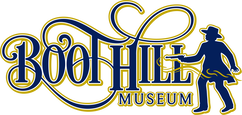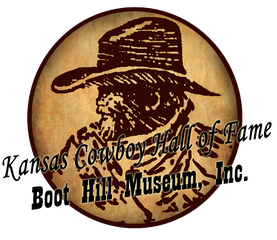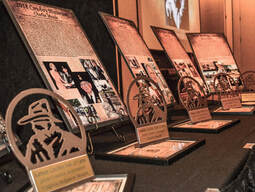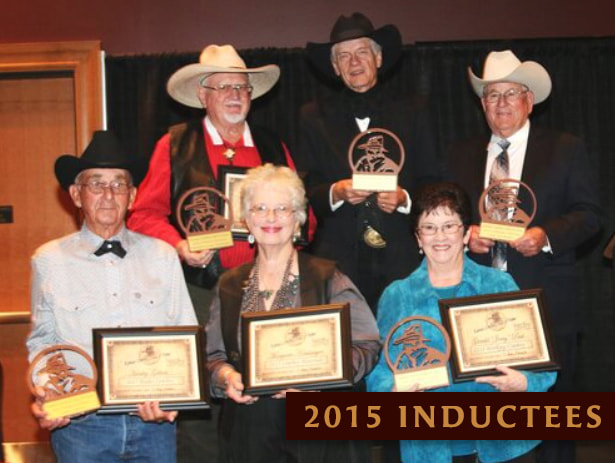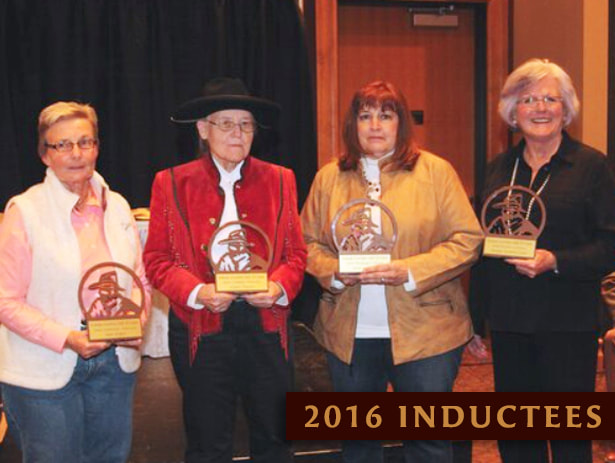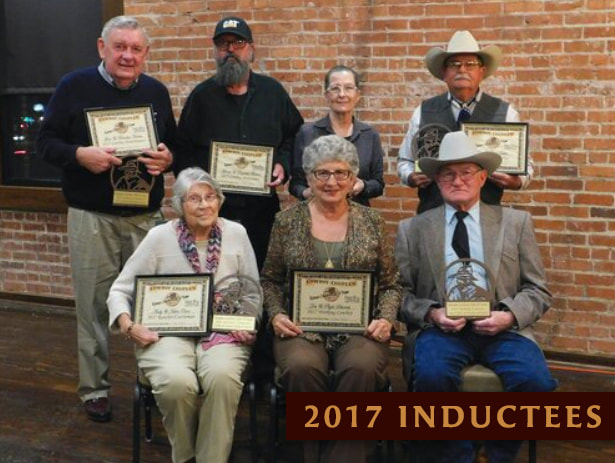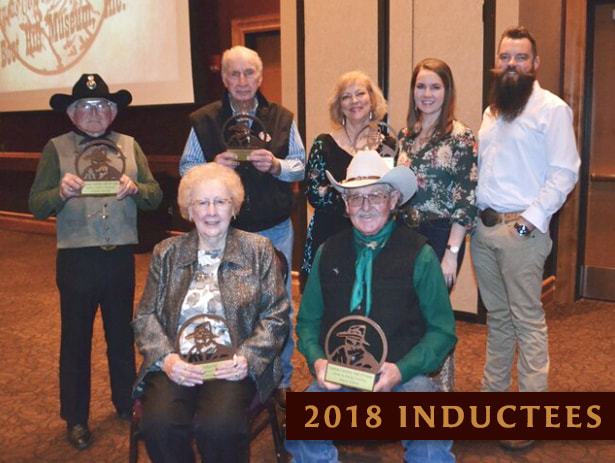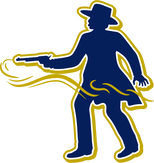|
|
B O O T H I L L M U S E U MKansas Cowboy Hall of Fame2004 Inductees
Horace Greely "Buck" Adams
2004
Rancher/Cattleman Horace Greely “Buck” Adams, owner of the XI Ranch located near Plains, Kansas, was born in Topeka in 1921 and lived on the XI Ranch as a child. By 1923, Buck’s grandfather had amassed 75,000 acres on the ranch. Unfortunately, Buck’s immediate family had to move away in 1933 to their farm in eastern Kansas because his younger brother had dust pneumonia. Buck married Wynona Keller in 1943. Two years later, the couple moved to the XI Ranch, where they raised their family. Growing up during the Great Depression and Dust Bowl Era, Buck learned how tough the ranching lifestyle could be. He recalled a time when his family ran 5,000 heifers on their 75,000 acres; yet by 1934, they sold almost all of them. After moving back to the XI Ranch, Buck devoted the rest of his life to ranching. He endured many of the same problems his grandfather had dealt with before him. In the 1950s, a drought caused Buck to run 150 cattle on 25,000 acres that normally held 1,000 head. Later, in the spring of 1957, a blizzard broke the drought and killed sixty of their 150 heads. Yet Buck persevered. Buck believed that a handshake sealed a deal. Buck’s son, H.G. Adams IV, couldn’t recall a time when his father had a contract to sell cattle. He had a reputation for never backing out on a deal, even if the price of beef increased after the agreement was made. Being a conservationist by nature kept him in the agriculture business, even during the hardest of times. He preached about the need to take care of the land. Buck wanted to join the rodeo circuit during his youth. He felt his height of 6’1” and weight of 200 lbs. would have been an advantage in steer roping competitions. Buck would always look back with a twinge of regret that he never had the time or money to fulfill his rodeo dreams. Horace Greely “Buck” Adams passed away in 1995, leaving the XI Ranch to his family and a lifetime of ranching knowledge to all he came in contact with.
“My father was a conservationist before anyone ever thought about what that meant.” – H.G. Adams IV describing his father’s dedication to preserving the land. JIM Hoy
2004
Cowboy Historian James F. “Jim” Hoy, a professor of English at Emporia State University was raised on a stock ranch near Cassoday. Jim has lived in the Flint Hills most of his life. He obtained a Bachelors of Science Degree from Kansas State University in 1961. After fulfilling various internships, Hoy taught at El Dorado Junior High School from 1963 to 1965. He moved on to teaching at a college level. Jim earned his Masters Degree from Emporia State University and went on to complete his Doctorate Degree in 1970. He served as the Chair of the English Department at Emporia State for 10 years. In 1990, returned to teaching and researching full-time. Hoy’s academic interests include Western American Literature, Australian Outback folklore and literature, and Great Plains folklore. He has published over one hundred articles and is the author or co-author of nine books. The University of Oklahoma Press published one of Jim’s works, Cowboys and Kansas: Stories from the Tallgrass Prairie. His chief interest is the folklore of ranching, both historical and contemporary, with a special emphasis on the Great Plains and particularly the Flint Hills. Hoy gives lectures and programs for school, community and professional groups throughout the region. Since 1983, he has written a weekly newspaper column titled “Plains Folk”. In 1996, the Library of Congress appointed Jim to their Board of Trustees of the American Folklife Center. Jim’s research has taken him onto the back roads of the American West and tracks of the Australian brush to discover cattle guards, hay barracks, folk songs and old-timers willing to talk about the way things were.
“As a folklorist and native plainsman, Jim Hoy is committed to documenting and celebrating the lives of his fellow plains folk, as well as seeking out the extraordinary while encouraging pride of region in those fortunate few who dwell in the plains.” – A biography describing Jim Hoy. Charles "Floyd" Rumford, Jr.
2004
Rodeo Cowboy Charles “Floyd” Rumford, Jr., a rodeo stock contractor for over fifty years, was born December 18, 1920. As a child he broke every mule and horse on his family’s farm. Before the age of ten, a Hutchinson sale barn hired Floyd to ride horses around the auction ring for $2.00. While serving in the South Pacific during World War II, Rumford decided he was going to participate in rodeos. In 1947, he won the All-Around Cowboy Title at Kingman’s Cattlemen’s Rodeo. He had a reputation for being able to ride anything with four legs. In 1949, Floyd spent three months in a hospital with a broken leg after he overturned a tractor. With talk of amputation he realized he would be crippled for life. Floyd saw his rodeo career slipping away. Before he was out of the hospital Floyd decided he would be a stock contractor and produced his first rodeo. Due to his injuries, he was unable to attend this successful event that was held in conjunction with the Sterling Saddle Club, but it paid $400 of his medical expenses. Animals needed for competitions came from Rumford’s farm and from area RCA Stock Contractors. The following year Floyd produced four rodeos in Kansas. Three years later, Floyd became an official rodeo stock contractor, giving rise to the Rumford Rodeo Company, which became known for its outstanding stock. Every year a generation of bucking horses and bulls was born. Floyd told rodeo committees if they’d bring in a horse that he couldn’t ride, he would knock $100.00 off his price. Floyd recalled, “They’d bring in a wild, crazy horse…I’d climb in the chute, lay down on the horse with my head towards it backside, lock my feet around its neck and grab his flanks…they’d swing open the gate and I’d come out riding him backwards…the crowd enjoyed it…sometimes you don’t get off gracefully, but I was never bucked off.” Rodeo was a family affair for Floyd, his wife Lola and their two sons Bronc and Tommy. Rumford Rodeo Company is still a family owned and operated business near Abbyville, Kansas. Every year, it produces an average twenty-five professional rodeos, as well as supply stock for 40 rodeos in the midwest and southwest. The company still supplies regular qualifying, bucking stock for the National Finals Rodeo. They also conduct various high school, college and ranch rodeos. Floyd’s son Bronc said, “Rodeo was really in its infancy when Dad got started.” Floyd also helped start the Abbyville Rodeo. At the rodeo’s first performance, Floyd rode a bronco for an enthusiastic hometown crowd. In 1983, for the Abbyville Rodeo’s 20th Anniversary, Floyd climbed on another bronco. Ten years later, at the rodeo’s 30th Anniversary, Floyd – then seventy-years-old – again gave another crowd-pleasing bronco ride. In 1998, the Women’s Professional Rodeo Association selected Rumford Rodeo Company as its Stock Contractor of the Year. Later that same year, Rumford passed away on May 25th. Floyd – an author, poet, storyteller and rodeo cowboy – is remembered for his genuine interest in people, his love of horses and rodeos, and most importantly the love he held for his family and friends.
“I just always had a way with horses…when I was four years old I’d hitch up a team of horses and take my older sister to school… About that time, a first cousin of mine and I decided we were going to be cowboys. Otis W. Jennings
2004
Working Cowboy Otis Jennings was born March 4, 1923 in Burr Oak, Kansas. Otis lived virtually all his life in Kansas. As a child, he moved to Garden City with his parents, Roy and Mae Jennings. Soon after, Otis met and worked for a man who owned racehorses and worked as a horse trader. This started his lifelong interest in working with horses and cattle. In 1943, Otis married Shirley Haflich and worked on her family’s farm east of Garden City. During this time, he kept a few ponies and began working with colts from neighboring farms. He also started working as a “contract cowboy” looking after others’ cattle for pay. In 1962, Otis and Shirley purchased a quarter section of land west of Lakin. After moving, Otis vowed, “They were going to do whatever they had to do to make a living in the horse and cow world.” The State of Kansas hired Otis as a Brand Inspector. Besides the brand work with feedlots in Kearney County and the sale barn in Syracuse, the couple kept busy riding neighbors’ colts and continuing Otis’s business. In 1972, Otis and Shirley built an indoor arena at their home in Lakin. Otis performed all of the construction on the building’s interior. In 1978, the couple purchased a string of rodeo stock; creating J-J Rodeo Company. When they started producing rodeos, there were only three Little Britches Rodeos in western Kansas. Their hard work and dedication led to twenty Little Britches Rodeos being produced in the area. When asked why he never worked the pro-rodeos, instead working with children, Otis always replied, “Kids have to start somewhere.” In 1995, Otis received the Bob Payne Memorial Award at the Kansas Ranch Rodeo Championship as a tribute to his dedication to his family, his job, his integrity, his honesty and his willingness to help others. Otis suffered a debilitating stroke in 1996. He had spent the day before in the saddle, just as he had everyday before that; he then worried about whether or not he would be a cowboy anymore. All who cared about Otis quickly reminded him that once a cowboy, always a cowboy. Otis passed away on Saturday, January 11, 2003 in Lakin, Kansas. Throngs paid their respects to Otis “Pappy” Jennings, the man who had led many of the town’s rodeo parades and had provided many years of entertainment for rodeo fans.
“The word ‘cowboy’ and the name Otis Jennings are synonymous.” – Jo Vanatta describing Otis Jennings. Johnny Western
2004
Cowboy Entertainer/Artist Johnny Western, a successful radio personality, was born in Two Harbors, Minnesota. Johnny received his first guitar when he was twelve years old. The next year he sang and played his guitar on radio shows. When he was 15, Johnny received his own full-time radio show on KDHL in Northfield, Minnesota, where Billboard Magazine dubbed him the youngest DJ on commercial radio in the United States. At the age of sixteen he released his song, “The Violet and the Rose.” After high school, Johnny met Gene Autry who signed him to appear in motion pictures. Between 1957 and 1959, Western appeared in several movies. Later, Western recorded a pilot for one of the directors of the hit television western “Gunsmoke”; for a new show called “Pony Express”. Over the next two years, Hollywood directors cast Johnny in five feature western films and thirty-two episodes for various television westerns. Western began writing a monthly column titled “The Filmland Horseman” for Western Horseman Magazine featuring actors from the big and small screen. From 1958 to 1997, Johnny toured and performed with the Johnny Cash Show. During this time, he also wrote a theme song for the television show “Have Gun Will Travel” and co-wrote songs for “Johnny Yuma”, “The Rebel” and “Bonanza.” In 1986, Western became a Wichita radio station where he brings first-hand knowledge of the country music business and the country western stars to his daily broadcasts. In 1993, the TV Theme Hall of Fame inducted Johnny in New York City. He joined the ranks of the Country Music Disc Jockey Hall of Fame in 2000, as well as the Old Time Country Music Hall of fame in Anita, Iowa. A year later, the Western Music Hall of Fame inducted Johnny. In 2002 the city of Wichita inducted Johnny into the Wichita Professional Broadcasters Hall of Fame. And in 2004, Johnny accepted his honorary induction into the Kansas Western Swing Hall of Fame.
“Johnny is one of country music’s true gentlemen and walking encyclopedia of country music information.” – A biography describing Johnny Western. Kansas Cowboy Hall of Fame
A division of Boot Hill Museum, Inc. of Dodge City, Kansas | A 501(c)(3) Not For Profit Corporation |
